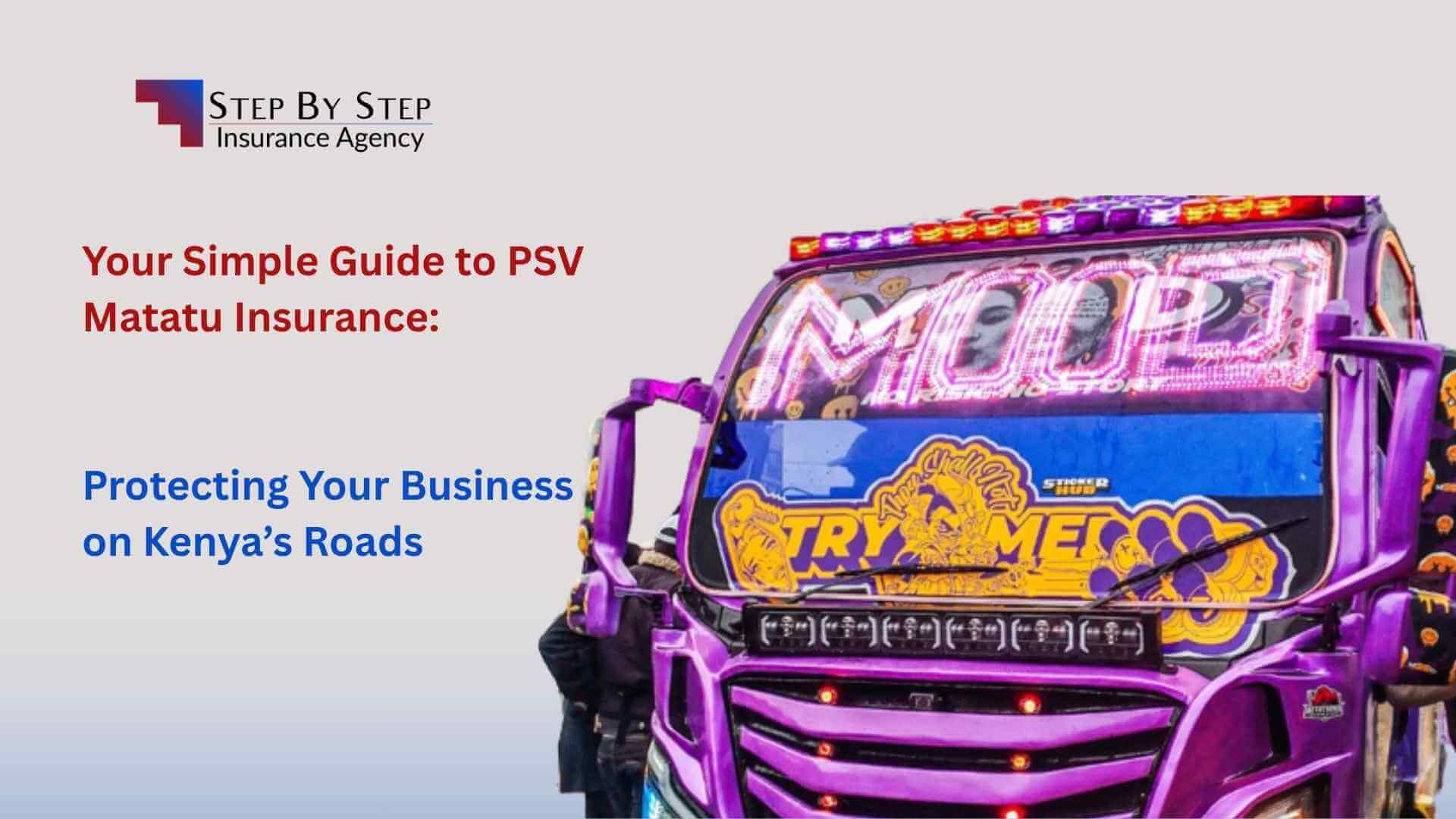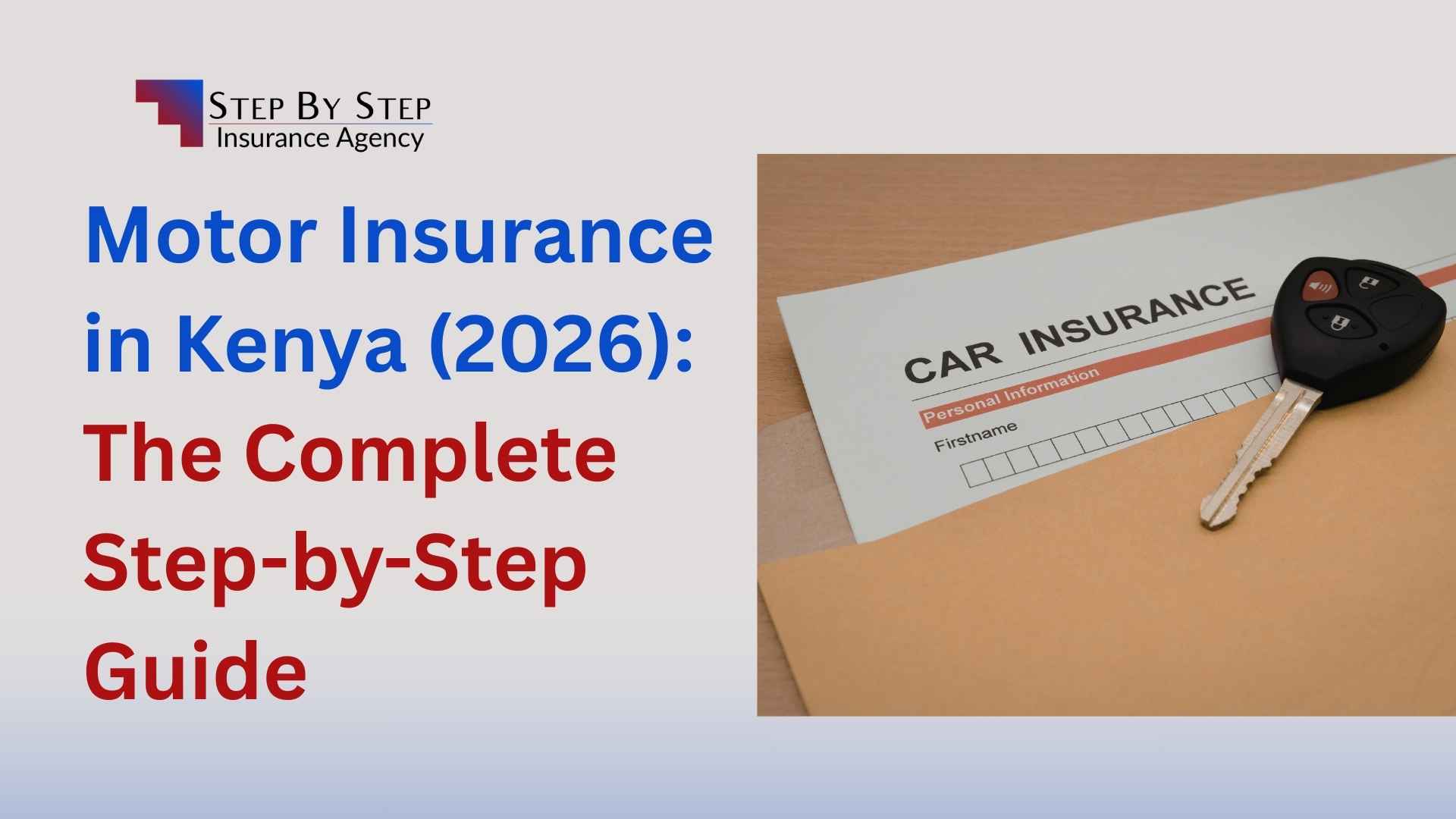A Simple Guide to PSV Matatu Insurance in Kenya
Getting the right insurance for your matatu isn’t just a box to tick for compliance — it’s a smart business decision. With a well‑tailored PSV Matatu insurance plan, you protect your assets, preserve your livelihood, and make sure every passenger, driver, and loader is covered. Step by Step Insurance is here to guide you every step of the way.
📌 Key Takeaways
- PSV insurance is legally mandatory for all matatus operating in Kenya
- Using the wrong policy type can lead to claim rejection
- Comprehensive coverage offers the best protection for your business
- Premium costs depend on seating capacity, vehicle value, and driver profile
- Proper documentation and timely claims reporting are essential
📑 Table of Contents
- I. Legal & Regulatory Foundations
- II. Types of PSV Matatu Insurance
- III. Key Components & Optional Add-Ons
- IV. How Premiums Are Calculated
- V. Important Terms, Exclusions & Conditions
- VI. Tailoring the Right Insurance Strategy
- VII. Risks of Under-Insuring or Non-Compliance
- VIII. Getting Started
- Contact & Consultation
💬 Join Our Insurance Community
Interested in staying updated on insurance trends and news in Kenya? Join our WhatsApp group to connect with others in the insurance community.
Join Our WhatsApp GroupI. Legal & Regulatory Foundations: Why PSV Matatu Insurance Is Non‑Negotiable
A. The Legal Requirement
Under Kenyan law, no motor vehicle may be used on a public road unless there is valid third-party insurance or an approved security. Violation is a criminal offence: fines (up to KES 10,000), possible imprisonment (up to 2 years), or both. Repeat offenders may be disqualified from holding or obtaining a driving license.
Certificate of Insurance Rules
The Insurance (Motor Vehicles Third Party Risks) (Certificate of Insurance) Rules govern how the certificate of insurance should look, be carried, and displayed. For matatus (PSVs), the certificate takes a specific form (Form 1). After an accident, if a certificate is not inspected at the scene, you must show it at a police station within 24 hours.
Limitation on Liability
The insurer’s maximum mandatory third-party liability per person is capped by law. This means very large claims could be limited.
B. Case Law & Practical Implications
In a 2016 civil suit, the court declared that if a vehicle insured under a “commercial vehicle” policy is later used as a matatu (public service), the insurer may refuse to cover passenger liability because the policy did not reflect the change in use. This underscores the need to buy the right class of cover. Using a commercial or private‑vehicle policy for a matatu is risky and typically not acceptable for public transport use.
II. Types of PSV Matatu Insurance: What You Can Choose
PSV Matatu operators in Kenya typically select from three main insurance types:
| Policy Type | Covered Risks | Limitations / Notes |
|---|---|---|
| Third-Party Only (TPO) | Legal liability for third parties — bodily injury, death, property damage | Does not cover your own vehicle’s damage or theft. Mandatory under law. |
| Third-Party, Fire & Theft (TPFT) | Everything TPO covers + risk from fire or theft of your PSV | Less common; ideal for slightly more protection than TPO. |
| Comprehensive Cover | Third-party liability + accident damage to your matatu + fire + theft | Typically annual policies only. Requires a motor-vehicle valuation report to determine the insured value. |
III. Key Components of PSV Matatu Insurance & Optional Add‑Ons
A. Standard (“Must‑Have”) Protections
Passenger Legal Liability (PLL): Ensures compensation for passengers in case of injury or death.
Third-Party Property Damage: Covers damage to property such as vehicles or buildings when your matatu is at fault.
B. Optional Add‑Ons
Political Violence & Terrorism (PVT): Covers loss or damage arising from riots, civil unrest, or acts of terrorism.
Excess Protector: Reduces your out-of-pocket excess in a claim.
Occupational Group Personal Accident: Provides cover for fatality or injury to the driver and loader.
IV. How Premiums (Costs) Are Calculated
| Risk Factor | How It Affects Premium |
|---|---|
| Type of coverage (TPO, TPFT, Comprehensive) | More comprehensive = higher premium |
| Seating capacity | More seats (up to 36) = higher liability = higher premium |
| Vehicle age & value | Older vehicles may cost more; declared value matters |
| Operating type/use | Urban vs. long-distance travel changes risk exposure |
| Driver profile | Age, driving experience, and license history influence premium |
| Claims history | No-Claim Discount usually does not apply to PSVs |
| Excess amount | Higher voluntary excess can reduce premium; additional excess may apply for drivers under 24 or with less than 24 months’ full license |
For more information on insurance pricing trends, check out our article on 2025 Motor Insurance Pricing in Kenya.
V. Important Terms, Exclusions & Conditions
- Overloading: Carrying more passengers than licensed can lead to claim rejection.
- Roadworthiness & Maintenance: Vehicle must be maintained in good condition. Poor maintenance may void claims.
- Valuation Requirement: Required for comprehensive cover; without it, full coverage may be denied.
- Anti-Theft Devices: Theft cover may require approved immobilizers or trackers.
- Disclosure Duty: All relevant information must be declared accurately.
- Use of Certificate: Insurance certificate must be displayed; if not inspected at the accident scene, present within 24 hours.
Claims Process
- Notify your insurer (or Step by Step) immediately (within 14 days).
- Report theft or criminal incidents to the police immediately.
- Do not admit fault or make payments without written permission.
- Avoid unauthorized repairs; get approval first.
- Provide essential documentation: Police abstract, driver and conductor statements, vehicle inspection report, licensing documents.
Learn more about the claims process in our guide: Accidents Happen: Here’s How to Get Back on the Road Safely and Faster with the Right PSV Cover.
VI. Tailoring the Right Insurance Strategy for Your Matatu Business
Step by Step Insurance helps you build a PSV insurance “uniform” that fits your business perfectly:
- Risk Assessment & Matching: Analyze fleet routes, seating, and usage; match with suitable underwriters.
- Payment Flexibility: Options include Mpesa Paybill, bank transfer, and Banker’s Cheque.
- Premium Financing: Pay annual premiums in manageable installments through partner financial institutions.
- Renewal & Claims Support: Assistance through renewal, valuation updates, and claims.
VII. Risks of Under-Insuring or Non-Compliance
- Legal Penalties: Operating without valid PSV insurance can lead to fines, imprisonment, or license loss.
- Claim Denial: Using the wrong policy type may result in refusal of passenger claims.
- Under-Compensation: Without proper valuation, payouts may be less than expected.
- Financial Strain: Minimal cover may result in high out-of-pocket repair costs.
VIII. Getting Started: How to Work with Step by Step Insurance
| Step | Your Action | Our Support |
|---|---|---|
| 1. Initial Consultation | Share fleet details — vehicles, seating, routes | Assess risk, recommend policy types, identify underwriters |
| 2. Application & Valuation | Provide vehicle info and valuation report | Help with valuation, complete policy application, select add-ons |
| 3. Payment & Policy Issuance | Choose payment method | Finalize policy, issue certificate, guide on proper display |
| 4. Claims & Renewal | Follow claims procedure; update at renewal | Support through claims and renewal process |
Contact Us / Request a Consultation
Ready to protect your matatu business? Get in touch with our insurance experts for personalized advice and quotes.
Final Word
Operating a matatu is more than a job — it’s a responsibility. The right insurance isn’t just compliance; it’s a tool for long-term stability. With Step by Step Insurance, you get more than a policy — you get a partner. We help you understand your risks, navigate legal requirements, and build protection that keeps your business moving safely and confidently.
References
- Insurance (Motor Vehicles Third Party Risks) Act, Cap. 405 — Kenya Law
- Insurance (Motor Vehicles Third Party Risks) (Certificate of Insurance) Rules (Legal Notice 10 of 1999) — Kenya Law
- Step by Step Insurance Kenya — stepbystepinsurance.co.ke
- Sheria Ocluse — Kenya Acts and Legal Summaries






